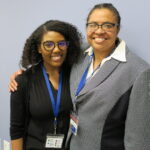Description
In May 2020, communities across the United States were emerging from shelter-at-home measures put in place to stem the COVID-19 pandemic. In Minneapolis, George Floyd, an unarmed Black man, was killed when a white police officer kneeled on his neck for nearly nine minutes. The nation, and then world, erupted in protests. In this recording, Providence caregivers Jeremy Edmonds and Victoria Johnson reveal their own experiences with racism, and possible remedies for social healing.
Participants
-
Jeremy Edmonds
-
Victoria Johnson
-
Hear Me Now Providence




